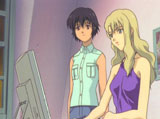

Quick Links:
Noir
As I began the viewing of this seven disc series, I was pleased to find the first episode full of intense action, alongside the required character introductions (and their dilemmas). The important concept of the series is touched on in the first episode: Noir is much more than just a plethora of gunfights; it is the search for forgotten answers and lost memories within the realistic, modern France and Mediterranean areas.
In the first volume of Noir, a blonde and deadly Mireille Bouquet, trustworthy assassin-for-hire, is sought out by an amnesiac named Kirika Yumura. This younger brunette knows nothing beyond her true name, "Noir," and her innate, flawless assassination skills. Both women believe they hold a puzzle-piece to the other's past, and thus they team together under the codename Noir in a pilgrimage for answers. They then post their alias on the web open for contracts, and soon begin to take job offers, regardless of the employers or their motives. Yet each mission they accept seems to be more of a game, more of a test than a simple hit.
Soon Mireille and Kirika become hunted for both their existence and the dormant knowledge within themselves. From ridiculous numbers of stealthy and deadly agents-in-suits, to corporate leaders and resistance factions playing both sides, the viewer is treated to awesome displays of weaponry and tactical combat, as Mireille and Kirika must defend against daily attempts on their lives. It is soon apparent to the two that some entity is constantly watching, always setting new traps for the duo.
Noir, at its core, is similar to the Film Noir style, yet the anime diverges into originality in many important cases. Director Kouichi Mashimo and Ryoe Tsukimura (credited for the original concept, composition, and screenplay of Noir) each seem to have appreciated and studied the Film Noir genre to an important extent. One of the main themes of Film Noir is a constant ambiguity and murky disillusionment, both within the souls of the characters, and within their surroundings and enemies. Coupled to this, Film Noir is known for a not-so-rare use of flashbacks. Mashimo and Tsukimura used both of these traits in the Noir anime to help create the very foundation of their production.
Yet the series is not entirely bound to Film Noir rules. A sincerely humane assassin is an anomaly in Film Noir, yet this unusual character concept is a keystone to the Noir anime. Another divergence from Film Noir standards is the anime's large quantity of characters that are pure of heart and intention, even at the disregarding of their deadly consequences. Typically, a Film Noir movie will have characters tainted with complex morals, with their choices almost exclusively based on selfish gain. The choosing of the best aspects from Film Noir to create the Noir anime was well executed by Tsukimura and Mashimo.
The animation in this series is top of the line quality. The Noir artists seemed to have worked meticulously on the transfer of real-life weaponry to the anime. The realism was continued in the characters, their movements, and their environments by the animation team who created .hack//SIGN. Coupling these two results together provides the viewer with an appealing spy-assassin series devoid of fantasy-style action (where bullets only hit the bad guys, and weapon magazines never run out of ammunition). Though at times Mireille and Kirika seem up against near-impossible odds, the resulting fights are realistically staged, tactically feasible, and ultimately, very much believable.
The music flows invigoratingly from Yuki Kajiura, whose fame spreads to the .hack//SIGN soundtracks. Though the Noir and .hack//SIGN OSTs each connect to the viewer's soul with a genuine depth, Noir approaches the emotions by communicating a more solemn spectrum of feelings. This is done through lamenting melodies, piano pieces overflowing with great sadness, and choir vocals mingled with well-written (and well-directed) orchestra movements to help communicate a feeling of deep importance and seriousness in each scene of Noir.
The extras are sweet and simple. A worthy bonus for each DVD is a pamphlet insert, containing information about the production of Noir, as well as "answered questions" sections to help the sometimes-confused viewer. These inserts give a significant and deeper look into the drama, purpose, and even the weaponry of the series. Also included on each disc are previews (now a standard in DVD releases), as well as a clean opening and ending.
All things considered, Noir is a highly addictive eye-candy: a pleasure to watch on many levels, whether for intellectual contemplation or sheer entertainment (or better yet, a mix of both!). Well-choreographed action, realistic weapons and TV-approved violence blend precisely with an original and captivating journey into the world of spies, secret organizations, crazy spiritual philosophy, and a deeper understanding of comradery. With so much going on within Noir, this series is a must-see for the standard anime otaku.
Distributor: ADV Films Creator: Kouichi Mashimo / Bee Train Released: 2001-2002
Plot: A Character Design: A+ Animation Quality: A+ Music: A+ Overall: A+



